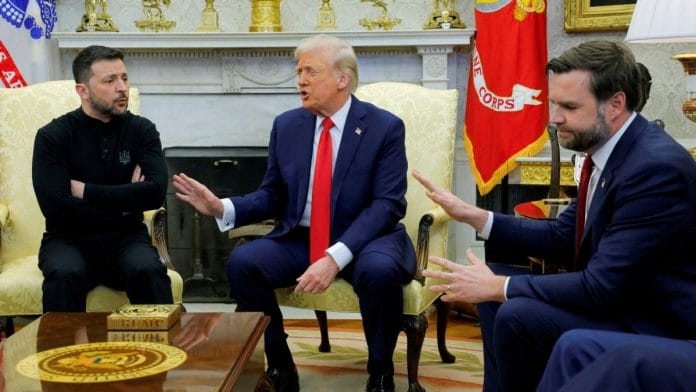Thank you dear subscribers, we are overwhelmed with your response.
Your Turn is a unique section from ThePrint featuring points of view from its subscribers. If you are a subscriber, have a point of view, please send it to us. If not, do subscribe here: https://theprint.in/subscribe/
The United States has made a significant policy shift regarding the Ukraine-Russia conflict, evident through recent developments. President Trump has discontinued military aid to Ukraine, aligning more with Kremlin interests. This decision has brought out varied responses and carries serious consequences for the ongoing war. While Russia perceives it as an occasion to strengthen its position, Ukraine faces a bleak future without Western support.
Russia’s Perspective: A Strategic Palm
Russian officials have welcomed the US decision to pause weapons assistance to Ukraine. Russia’s primary objective is to inflict maximum damage on Ukraine. Former President Dmitry Medvedev has suggested that Russia should heighten military operations, acknowledging that US aid might resume in the future. The shift in the US policy shift will potentially weaken Ukraine’s capability to sustain its defenses, leading to an outcome that benefits Russia.
Would Ukraine have survived without international support?
At the beginning of the Ukraine-Russia war, there was a widespread doubt on Ukraine’s ability to withstand Russian military power. Many analysts expected Ukraine would crumble within weeks, given the stark imbalance in military capabilities. Russia, with its superior firepower, air dominance, and large troop figures, was expected to overrun Kyiv in a matter of days. However, Ukraine’s survival was largely due to the unwavering support from the West.
Had Ukraine not received international military and financial assistance, the following likely scenarios would have played out:
Quick Russian Annexation: Ukraine would have fallen within months, possibly weeks. Major cities like Kyiv and Lviv would have been occupied, and a Russian-backed government installed, similar to what happened in Crimea in 2014.
Mass Exodus and Humanitarian Crisis: Without support, Ukraine would have faced a catastrophic humanitarian crisis. Millions more Ukrainians would have fled to neighboring countries like Poland, Romania, and Germany, leading to one of the largest refugee crises in modern history.
What Would Have Been Russia’s Next Move?
If Ukraine had fallen, Russia’s ambitions likely wouldn’t have stopped there. Based on Putin’s historical rhetoric and Russia’s geopolitical interests, the following annexations or conflicts could have been next:
Moldova and Transnistria: Russia has long supported the breakaway region of Transnistria in Moldova. With Ukraine under Russian control, Moldova would have been highly vulnerable, and Russia could have moved swiftly to annex it.
Baltic States (Estonia, Latvia, Lithuania): While these countries are NATO members, a Russian victory in Ukraine might have encouraged Moscow to test NATO’s resolve. Russia could have increased hybrid warfare tactics, cyberattacks, and political destabilization efforts to weaken the region.
Georgia: Russia has already occupied twenty percent of Georgia (Abkhazia and South Ossetia) since 2008. A victorious Russia in Ukraine might have sought to annex these territories fully and push further into Georgia, reigniting hostilities.
What Happens Now? The US realigning its priorities
With the US now aligning with Kremlin interests, the future of Ukraine and European security is in danger. Washington’s pivot away from Ukraine emboldens Russia and weakens the unity of NATO. With reduced Western intervention, Russia may intensify military operations in Ukraine, pushing for total control over Kyiv and the eastern regions. European nations, particularly Germany, France, and Poland, might strengthen their military spending to compensate for reduced American support.
How Will India Be Affected?
From an Indian perspective, this shift in global alliances presents both challenges and opportunities:
Energy Security: India imports a significant amount of oil from Russia at discounted prices. A closer US-Russia alignment could lead to stability in energy markets, benefiting India’s economy.
Geopolitical Realignment: India has maintained strong ties with Russia for defense and energy while strengthening strategic partnerships with the US With Washington pivoting towards Moscow, India might face diplomatic challenges, particularly in relation to China. To adapt, India may have to deepen regional partnerships with Japan and Australia to actively engage in global forums to safeguard its interests.
Defense and Trade Relations: India has historically depended on Russia for military supplies. If US-Russia ties improve, India could benefit from better trade deals and fewer restrictions on military technology transfers.
Future Outlook: A Geopolitical Power Shift
The ongoing realignment of global powers could mark the beginning of a new geopolitical order. If the US maintains its alignment with Kremlin interests, NATO’s influence might wane, leading to a more fragmented international system.
For India, this means navigating a more complex diplomatic landscape. New trade routes, defense partnerships, and economic strategies will be required to maintain stability and growth in an increasingly unpredictable world.
As the situation continues to evolve, the key question remains: Will the US sustain this policy shift, or is this a temporary maneuver? The coming months will provide the answer.
These pieces are being published as they have been received – they have not been edited/fact-checked by ThePrint.
Also read: China is waiting for Trump to falter—and step up to lead the world order


